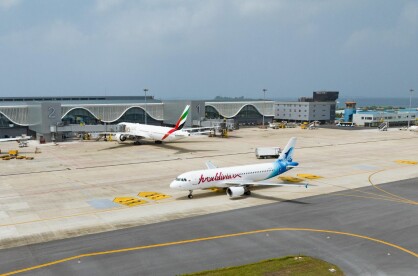As the Solih administration stands on the halfway line, it feels opportune to reflect on some of the President’s key pledges. Solih’s proposed solution to congested living, and the resulting economic strife, has been his championing of decentralisation - of resources and governance. So far, many welcome changes have taken place with regard to governance, with changes to local council laws, adjustments to council jurisdictions and expansions to independent decision making and wealth distribution. These have been cemented into policy through the eighth amendment of the Decentralisation Act. The amendment also came with the announcement of MVR1.5 billion allocated for regional housing projects, and, on the face of it, this is the most obvious solution to decongesting the Malé region.
There is no denying that political promises, over several administrations, are what has led the nation into this mess. Regrettably, most of these promises have been more “gut” driven than driven by research, data and reasonable projections. A huge portion of the country’s revenue has been sunk into fanciful pledges, where the government, for all intents and purposes, seemed happy to throw money at problems while never being able to remedy them. Even now there are multiple housing projects that lie un-utilised, incomplete or left for nature to reclaim the space.
Still, administrations continued to develop more and more housing projects in Hulhumalé, touting them as a solution to solving Malé’s congested, and financially constricted, living conditions — because those living in Malé are subject to sky-high rents which eat into upwards of 60 percent of their monthly incomes. The economic freedom of a resident of Malé is so tightly restricted that many are forced to live in shared spaces with extended families, which in itself leads to deteriorating social conditions. This is compounded by the constant migration to the Malé region, from all over the nation, in hopes of securing “a better life.” Malé, for decades, has been bursting at the seams in terms of space, which begs the question as to why residents continue to tolerate high rent prices in comparison to relatively much cheaper living elsewhere.
What is the cause of the issue in the first place?
The reality is obvious at a single glance; the region offers better healthcare, more employment opportunities, better education opportunities, and is the hub of commerce and industry.
Malé is, due to the great centralisation fallacy, where whatever one needed could be found — the allure of more “choice” drawing in more and more people, all vying for a place to live in the Greater Malé Region.
Half-baked state economic policies as well as a stubbornly “risk averse" financial sector has meant that one must succumb to immense debt to be able to develop their own land in the capital island. This debt, in terms of housing and real estate loans, keeps rents high, and thus fuels the vicious cycle of tenants being forced to burn an exorbitantly high percentage of their wages on accommodation — all the while the oversaturated job market means companies can afford to set pay as they see fit. Even those with “gainful” employment are unable to save nor can they afford to take risks towards additional income-generating ventures.
It is an accepted fact that local investment generates economic development, yet investments can only be plausible when one is not constantly living pay cheque to pay cheque.
Quick fixes or picking at the wound?
The current administration has chosen to make a show of a serious stab at the issue by committing to housing projects in the capital region as well as projects in the northernmost atolls. However, it is important to note that this exercise will not be advantageous in the long run. Beyond Malé, these are regions that do not suffer from congestion, and recent developments show easing of pressure as extremely short lived rather than being a long-term solution.
Case in point; the currently derelict and abandoned housing complexes in various regions of the country, such as in Addu — built with resources that could have served the country, and the specific region, better in other ways had they been deployed with more consideration. These areas do not have a housing demand, yet the intention of these housing projects seems to stem from a gross failure to comprehend decentralisation and its core rewards. To try and emulate the capital in other areas of the country would take immense, and unjustified, investments and time. To develop infrastructure such as specialist hospitals, housing complexes, academic spaces, etc. without proper study specific to the communities, in order to just gain political favour, will again prove to be an utter waste of the nation’s resources.
Building a solution
The end goal is decentralisation but in order to address this goal the administration has to address many moving parts, of which the housing crisis in the capital is but one. On this one, admittedly major, issue, providing cheaper alternatives in the form of social housing in the capital is one avenue in which the government can begin to tackle this crisis. State-owned, regulated housing options for the public will facilitate a market with lower rent burdens and give more and more people the opportunity to invest in other aspects of the economy — including setting up ventures and investments outside the capital.
The government should also look at other controls through the same prism; such as minimum wage to better address purchasing power and thus close the poverty gap that has been widened by the persisting rent issue. Residents, through programs and incentives, should be enticed to diversify in terms of income generating ventures. This can, with proper guidance, tools and resources, stimulate the stagnated local economies of all islands, optimally, creating job opportunities for those who remain in their own islands while working to negate the need to migrate for opportunities.
Additionally, the government’s attention needs to focus on better, more reliable, connectivity between our islands and allow communities to feed into, and from, the greater system without permanent migration. Commuting for work, given cheap and consistent public transportation, allows workers to move from their residence to their place of work and back again, and would ease congestion in centres of trade, commerce and education. Limited as they may be, there are already success stories of how entrepreneurs utilise air travel to conduct businesses by offering goods from the islands to the cities — and vice versa.
By encouraging further investment, while widening support channels, the government can bring about vitality and growth within the local economy. Increased connectivity would also mean increased accessibility to services such as healthcare. Instead of settling a specialist in each part of the country, the ability for a patient to book an appointment from home and arrange to attend appointments on time ensures resources are not wasted or needlessly replicated — provided the support mechanisms of transport and efficiency of health care systems can be somewhat guaranteed.
Another avenue is virtual connectivity by allowing, and encouraging, employment to be decentralised. COVID-19 has taught the nation that not all jobs or meetings need to happen on site. By exploring how, at least, civil service employment can be decentralised as much as possible, the government can once more allow individuals to follow career goals without the need for migration or over burdening transport and housing related resources.
Further, by perhaps developing an education system to cater to this mindset, the government can invite regulated private investment into decentralised models, increasing the available opportunities for those pursuing higher education without the need to settling in the city.
The government needs to address all these moving parts together and to apply lessons learned from past mistakes. Each decision in infrastructure, as well as governance development, needs to be viewed through the prism of decentralisation. Past instances of ignoring housing codes, glossing over transport laws, and other decisions made to curry political favour with constituents, with no real current or future benefit to them, is what has led to this dire situation.
The way forward
The Maldives does not need more housing buildings in random locations around the country. Nor does the nation need empty hospitals with cutting edge technology falling apart in regional centres due to a lack of human capital. Communities do not need more football fields than players in the islands. We do not need the government to build favour in pockets of the country with unsustainable development projects while at the same time entirely overlooking others.
What is needed is a smarter rethinking of our current situation. We need considerate and research-driven leaders to think outside the box. We need to see the bigger picture, to understand that decentralisation is slightly more complicated than just moving everything out of the capital. Our leaders need to have faith in the “average” Maldivian to embrace innovations and utilise new economic opportunities — opportunities the government should be looking to create expeditiously.
The decision to develop better connectivity through atoll ferries is a good start. The government should show an assured commitment to carrying this through by creating awareness and other incentives in order to ensure popularity and acceptance by the public. Most importantly, it should not stop there; the nation should be planning further ahead, not for the next two and a half years, but for generations to come.






